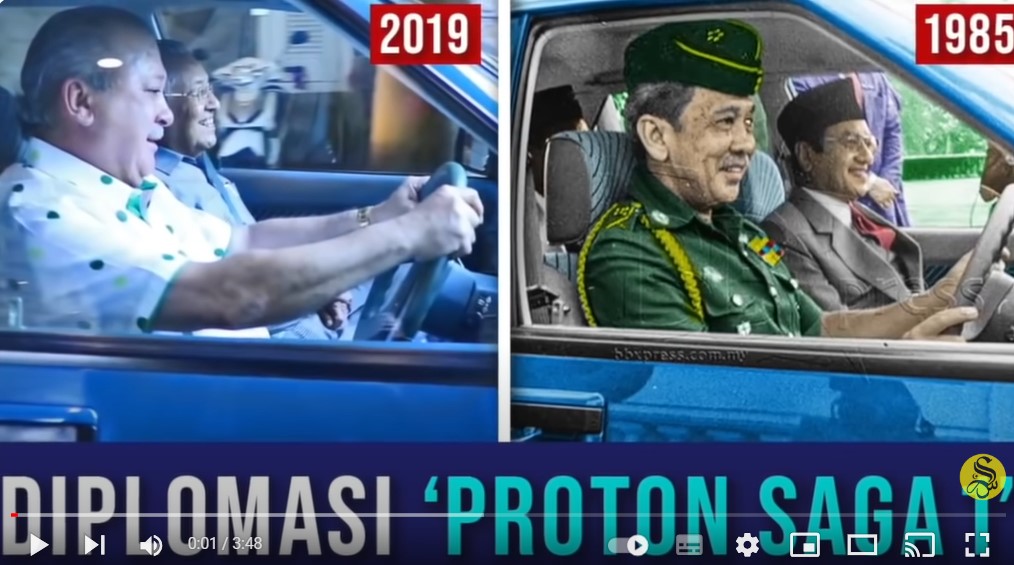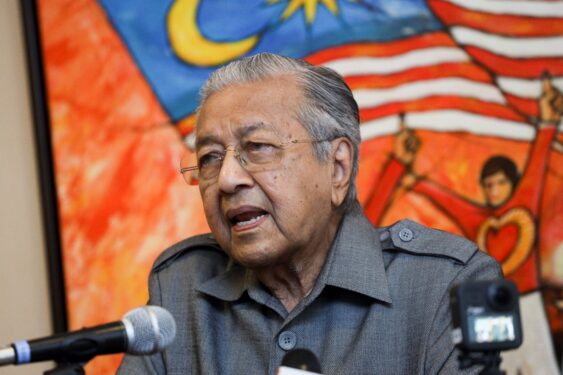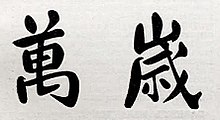
Does past spat between Tun M and the Malay rulers have bearing in today’s royalty relations?

MANY may be unaware or may have forgotten what transpired during former premier Tun Dr Mahathir Mohamad’s stand-off with the Malay rulers in 1983.
Prior to his ascension, the 17th Yang di-Pertuan Agong (YDPA) Sultan Ibrahim Sultan Iskandar had warned that he would go after a former prime minister (PM) who failed to consult the royal palace prior to the case regarding a few islets contended by Singapore being brought before the International Court of Justice.
There is not an iota of doubt that the YDPA was referring to none other than Dr Mahathir who at that time was on his second premiership stint (which lasted 22 months in total).
Because land matter to the states, Dr Mahathir should have the courtesy to consult the Johor ruler. It is his blatant disregard for the palace that eventually led to the wrath of the present Agong.
Now, Dr Mahathir is apparently reaping what he had sown. When he was PM, the country was literally brought to its knees by him.
A re-visit of what transpired in 1983 would help the younger generation understand what led to the sour relationship between Dr Mahathir and the state monarchs.
Too much power in one man
One of the main targets that came under his sledgehammer was the constitutional monarchy which is supposed to keep the three branches of the government – the Executive, the Judiciary and the Legislative – in check as well as to protect and uphold the federal constitution and the democracy of the country.
However, just two years after becoming the country’s fourth PM, Dr Mahathir bulldozed through the Constitution (Amendment) Bill 1983 which sought to clip the wings of the Malay rulers.
The then Agong, Sultan Ahmad Shah Sultan Abu Bakar, who is the father to Sultan Abdullah – the predecessor to the current Agong – refused to give his royal assent to it.
The Conference of Malay Rulers was also fully against the bill as it would mean that they would lose their powers to provide assent to a new piece of legislation. In short, once the law is passed by the state assembly or parliament, the bill will automatically become a law.
The bill also included the removal of the Agong’s power to declare an Emergency. That this was given to the PM would essentially make Dr Mahathir the most powerful man in the country.
According to former The Star columnist, Huzir Sulaiman, who in 2008 penned a series of three articles entitled “Mahathir vs the Malay Rulers”, the Conference of Malay Rulers unanimously rejected the amendments after a meeting in Selangor on Nov 20, 1983.
However, Dr Mahathir retaliated with a propaganda war against the Malay rulers. UMNO immediately whipped up a series of demonstrations in Alor Star, Bagan Datuk, Seremban, Batu Pahat and Melaka where police permits were never sought or approved.
The objective of the demonstrations was to express support and sympathy towards Dr Mahathir’s agenda.
Huzir further revealed in his article: “Whether or not the crowd figures were inflated by the UMNO-aligned media – it is true that they generally reported these events in positive terms. It is clear that the 1983 rallies were exciting evenings with republican sentiments on everyone’s minds, if not exactly on their lips.
“One of the most arresting images in Rais Yatim’s Faces in the Corridor of Power is a photograph of two youths at one such rally. They are wearing T-shirts bearing Dr Mahathir’s picture and the words “DAULAT RAKYAT”.”
One of the main targets that came under his sledgehammer was the constitutional monarchy which is supposed to keep the three branches of the government – the Executive, the Judiciary and the Legislative – in check as well as to protect and uphold the federal constitution and the democracy of the country.
However, just two years after becoming the country’s fourth PM, Dr Mahathir bulldozed through the Constitution (Amendment) Bill 1983 which sought to clip the wings of the Malay rulers.
The then Agong, Sultan Ahmad Shah Sultan Abu Bakar, who is the father to Sultan Abdullah – the predecessor to the current Agong – refused to give his royal assent to it.
The Conference of Malay Rulers was also fully against the bill as it would mean that they would lose their powers to provide assent to a new piece of legislation. In short, once the law is passed by the state assembly or parliament, the bill will automatically become a law.
The bill also included the removal of the Agong’s power to declare an Emergency. That this was given to the PM would essentially make Dr Mahathir the most powerful man in the country.
According to former The Star columnist, Huzir Sulaiman, who in 2008 penned a series of three articles entitled “Mahathir vs the Malay Rulers”, the Conference of Malay Rulers unanimously rejected the amendments after a meeting in Selangor on Nov 20, 1983.
However, Dr Mahathir retaliated with a propaganda war against the Malay rulers. UMNO immediately whipped up a series of demonstrations in Alor Star, Bagan Datuk, Seremban, Batu Pahat and Melaka where police permits were never sought or approved.
The objective of the demonstrations was to express support and sympathy towards Dr Mahathir’s agenda.
Huzir further revealed in his article: “Whether or not the crowd figures were inflated by the UMNO-aligned media – it is true that they generally reported these events in positive terms. It is clear that the 1983 rallies were exciting evenings with republican sentiments on everyone’s minds, if not exactly on their lips.
“One of the most arresting images in Rais Yatim’s Faces in the Corridor of Power is a photograph of two youths at one such rally. They are wearing T-shirts bearing Dr Mahathir’s picture and the words “DAULAT RAKYAT”.”

Tun Dr Mahathir Mohamad
In much the same modus operandi used to eventually force the thriving mini buses off the roads to give way to a consortium of buses, Dr Mahathir’s propaganda war continued for a couple of months against the monarchy.
According to Huzir, stories of “royal extravagance and impropriety” started emerging.
“The Government leaked the fact that they were compiling dossiers on the Sultans. RTM announced they were preparing a year-long TV series on the rulers and the Constitution,” Huzir wrote.
It is interesting to note that while UMNO Youth was used by Dr Mahathir to up its ante to call for the Government to gazette the Constitution (Amendment) Bill without waiting for the Agong’s assent, Dr Mahathir himself was involved in behind-the-scenes negotiations with the Malay rulers.
Throughout the entire period, it was Dr Mahathir who instigated the Malaysians to stand up against the Malay rulers.
For example, Huzir cited that at a rally in Alor Star on Nov 26 that year (1983), Dr Mahathir declared that, “It was the rakyat who had protested against the Malayan Union after the Second World War; it was the rakyat who wanted a democratic system that would enable them to choose their own leaders. It was always the people who had fought for their destiny.”
Then, at the biggest rally held in Batu Pahat, he again took a thinly veiled dig at the Malay rulers, “We weren’t born Ministers? We’re up here because we were chosen by all of you.”
Dr Mahathir did just the opposite of the first two principles of the Rukun Negara. He used the same strategy against Tunku Abdul Rahman to dismantle the monarchy.
Divide and rule
“Public opinion was divided over the issue,” observed Huzir. “Rural Malays tended to support the Rulers; urban Malays while not uncritical of Mahathir’s strategies and motives were more ready to accept egalitarian ideas.”
In much the same modus operandi used to eventually force the thriving mini buses off the roads to give way to a consortium of buses, Dr Mahathir’s propaganda war continued for a couple of months against the monarchy.
According to Huzir, stories of “royal extravagance and impropriety” started emerging.
“The Government leaked the fact that they were compiling dossiers on the Sultans. RTM announced they were preparing a year-long TV series on the rulers and the Constitution,” Huzir wrote.
It is interesting to note that while UMNO Youth was used by Dr Mahathir to up its ante to call for the Government to gazette the Constitution (Amendment) Bill without waiting for the Agong’s assent, Dr Mahathir himself was involved in behind-the-scenes negotiations with the Malay rulers.
Throughout the entire period, it was Dr Mahathir who instigated the Malaysians to stand up against the Malay rulers.
For example, Huzir cited that at a rally in Alor Star on Nov 26 that year (1983), Dr Mahathir declared that, “It was the rakyat who had protested against the Malayan Union after the Second World War; it was the rakyat who wanted a democratic system that would enable them to choose their own leaders. It was always the people who had fought for their destiny.”
Then, at the biggest rally held in Batu Pahat, he again took a thinly veiled dig at the Malay rulers, “We weren’t born Ministers? We’re up here because we were chosen by all of you.”
Dr Mahathir did just the opposite of the first two principles of the Rukun Negara. He used the same strategy against Tunku Abdul Rahman to dismantle the monarchy.
Divide and rule
“Public opinion was divided over the issue,” observed Huzir. “Rural Malays tended to support the Rulers; urban Malays while not uncritical of Mahathir’s strategies and motives were more ready to accept egalitarian ideas.”
What surprised this writer was that, according to R.S. Milne and Diane K. Mauzy in Malaysian Politics Under Mahathir, the Chinese community supported the monarchy.
This one paragraph in the note explains it very well: “One might have expected that since the rulers and the Agung were symbols of ‘Malayness’, the Chinese would feel little loyalty to them. Paradoxically, they were quite pro-royalty because they did not really trust Malay politicians. Indeed, they viewed the Agung and the rulers as protectors of their vital interests.”
Dr Mahathir was able to consolidate his position after a series of incidents such as the Nov 19, 1985 Memali bloodshed which claimed the lives of 14 villagers and four policemen; Ops Lalang in 1987; UMNO’s own political crisis in 1987; and subsequently, the Judiciary crisis in 1988 which led to the sacking of former Lord President Tun Salleh Abas and three other Supreme Court judges.
According to Huzir again, “The PM’s campaign continued. He silenced the rulers over the issue of the 1987 ISA detentions; staged a hostile debate on the monarchy in the 1990 UMNO general assembly after the loss of Kelantan to PAS; removed the rulers’ immunity to prosecution following the constitutional crisis of 1992-1993; stripped away their flights, outriders and special hospital wards; and in 1994 – with little opposition – finally removed the need to obtain the rulers’ assent for State laws.”
It therefore comes as no surprise that Sultan Ibrahim does not trust Dr Mahathir and when the Royal Commission of Inquiry (RCI) is set up on Batu Puteh issue, Dr Mahathir should heed Lord Denning’s words, “Silence is not an option when things are ill done.”
To Dr Mahathir and his supporters, this may be an attempt for revenge; however, to most other Malaysians, this is the universal law of reaping the seeds of royalty, racial and religious sentiments that he had sown. – March 5, 2024
This one paragraph in the note explains it very well: “One might have expected that since the rulers and the Agung were symbols of ‘Malayness’, the Chinese would feel little loyalty to them. Paradoxically, they were quite pro-royalty because they did not really trust Malay politicians. Indeed, they viewed the Agung and the rulers as protectors of their vital interests.”
 |
Wan Sui Wan Wan Sui Dirgahayu Tuanku |
Dr Mahathir was able to consolidate his position after a series of incidents such as the Nov 19, 1985 Memali bloodshed which claimed the lives of 14 villagers and four policemen; Ops Lalang in 1987; UMNO’s own political crisis in 1987; and subsequently, the Judiciary crisis in 1988 which led to the sacking of former Lord President Tun Salleh Abas and three other Supreme Court judges.
According to Huzir again, “The PM’s campaign continued. He silenced the rulers over the issue of the 1987 ISA detentions; staged a hostile debate on the monarchy in the 1990 UMNO general assembly after the loss of Kelantan to PAS; removed the rulers’ immunity to prosecution following the constitutional crisis of 1992-1993; stripped away their flights, outriders and special hospital wards; and in 1994 – with little opposition – finally removed the need to obtain the rulers’ assent for State laws.”
It therefore comes as no surprise that Sultan Ibrahim does not trust Dr Mahathir and when the Royal Commission of Inquiry (RCI) is set up on Batu Puteh issue, Dr Mahathir should heed Lord Denning’s words, “Silence is not an option when things are ill done.”
To Dr Mahathir and his supporters, this may be an attempt for revenge; however, to most other Malaysians, this is the universal law of reaping the seeds of royalty, racial and religious sentiments that he had sown. – March 5, 2024

The fact of the matter is the ICJ case was lost under PM Dollah.
ReplyDeleteJohor Sultan is welcome to go after Dollah. Apparently there is only a husk of a man left.
At least Dollah only lost the Pedra Branca. On the other hand the Johor Sultanate lost the entire Singapore island and little islets.
DeleteKnow nothing fart of inconsequential!
DeleteJohor Sultanate lost the entire Singapore island and little islets when nationalism & true sovereign boundary were poorly defined.
The sleepy head lost Pedra Branca via totally incompetent handling of a clear sovereign issue on international court!